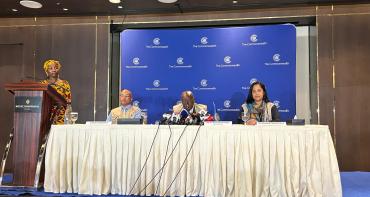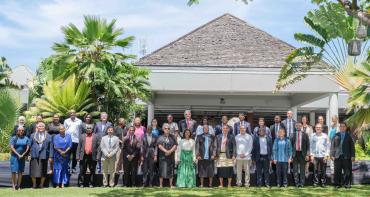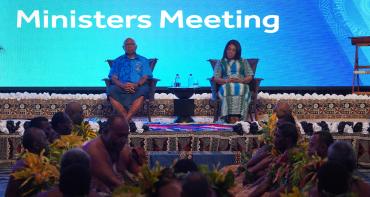The Commonwealth Legal Repository is a one-stop database of all publicly available laws from 31 Commonwealth countries. Government officials can use it as a reference guide when amending existing statutes or drafting new legislation to strengthen their justice systems.
You can also access the Commonwealth Legal Repository here
The Commonwealth Ministerial Action Group (CMAG) supports member countries to uphold the fundamental values of the Commonwealth, particularly democracy and good governance.
The Commonwealth places a high priority on being a family of peaceful, democratic countries which promotes and protects shared values, including the political values of democracy, the separation of powers, rule of law and human rights. CMAG is the custodian of these fundamental political values.
In the implementation of some of its programmes, the Rule of Law Section collaborates with Commonwealth accredited organisations such as:
The work on law and development promotes strategies to enable member countries to meet targets set under the post-2015 Development Agenda of the United Nations, notably Sustainable Development Goal 16.
It also promotes other work that uses an integrated approach to rule of law programmes by taking into account human rights, gender issues and sustainable development in the Commonwealth.
Commonwealth Law Ministers and Senior Officials of Law Ministries meet regularly biennially to advance this work and build consensus on topical issues. The latest meeting, held in Colombo, Sri Lanka, concluded with the adoption of the Commonwealth Law Ministers Declaration on Equal Access to Justice.
The Commonwealth Secretariat coordinates the Commonwealth Cyber Declaration programme. Adopted at CHOGM 2018, the Commonwealth Cyber Declaration confirms member countries’ commitment to a free, open, inclusive and secure cyberspace.
The Secretariat works with national, regional and international partners and provides clear, detailed and sustainable help to member states. This help builds member states capabilities to combat cybercrime through:
- training of law enforcement officers, prosecutors, and members of the judiciary on electronic evidence
- building a network of focal points for rapid and effective exchange of information
- develop appropriate legal frameworks on cybercrime and data protection
In support of the Commonwealth’s elections observations flagship programme, the Rule of Law Section of the Secretariat provides support in the form of constitutional and rule of law analysis as well as monitoring of electoral petitions and related court cases to Commonwealth Observer Groups.
To date, support has been provided for elections and referenda in:
- Sri Lanka (2015)
- Sierra Leone (2018)
- Pakistan (2018)
- Zimbabwe (2018)
- Nigeria (2019)
- Belize (2019)
- Dominica (2019)
- Namibia (2019)
- Guyana (2020)
The Rule of Law Section also supports member countries on the implementation of the Commonwealth Latimer House principles on the Three Branches of Government, which govern the interaction between parliament, the executive and the judiciary in democratic societies.



